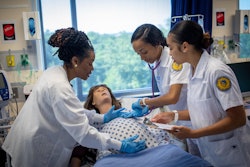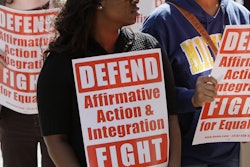The Association of Public and Land-grant Universities (APLU) virtually gathered over 1,500 university leaders for the first day of its 133rd annual meeting on Monday.
The theme of the three-day convening is “Equity & Resilience,” as university leaders reflect on a summer of racial justice organizing and the ongoing impact of the coronavirus on campuses, particularly for underrepresented students.
 Dr. Gregory Washington
Dr. Gregory Washington“We are expecting to see some of the gaps widened, or at least exposed,” said Joan Gabel, president of the University of Minnesota, in the opening plenary. “Our anecdotal data right now makes us think that when we do our next census, we’re going to be a little bit alarmed by what the pandemic has done for certain groups. And I don’t think anyone is surprised by that … The aftereffects will be with us arguably for a generation if we’re not conscientious and careful.”
She emphasized a need for renewed focus on financial aid – including emergency aid for students most hard hit by the pandemic – as well as mental health resources.
George Mason University President Dr. Gregory Washington, who also spoke in the opening plenary, highlighted inequitable broadband access as an obstacle in the shift to online education. He suggested that public universities prioritize turning spaces like libraries and parking lots into free Wi-Fi zones for students.
Speakers also noted the financial strains on public universities caused by the pandemic. Washington advocated for a focus on retraining programs amid the economic downturn and “creative partnerships” with industry, non-government organizations and other universities, especially partnerships between four-year institutions and community colleges.
“Rich community college partnerships are going to be helpful not just for students who are graduating but for individuals who are being displaced,” he said. “As you talk about how we can impact minority, low-income and first-generation [students], for many of our institutions, those students struggle to get in. Those partnerships with community colleges actually provide a great pathway for those students to enter our institutions.”
Later, in a session titled “Anti-racist Approaches to Systemic Transformation,” experts tackled how universities can not only respond to the current moment but engage in deep, structural change around racial inequities.
“The institutions of higher education that we occupy are microcosms of the larger systemic racism reflected in society,” said Dr. Roger Worthington, executive director of the Center for Diversity and Inclusion in Higher Education at the University of Maryland. “They commonly act on and reproduce social inequities and racism in the broader society.”
“Instead, I believe higher education institutions should act to eradicate racism embedded in institutional policies, procedures, practices and everyday operations,” he added.
For Dr. Keith Champagne – vice chancellor for student affairs and athletics at the University of Alaska Fairbanks – that process starts with acknowledging the inequities embedded in the history of public and land-grant universities. He pointed to the Morrill Act, which gave states land to finance land-grant universities in 1862.
 Meshea Poore
Meshea Poore“The Morrill Act was successful because the land expropriated from Native Americans or tribal nations was used for seed money for higher education,” he said. “In essence, over 10 million acres were taken from 250 tribes, bands and communities through over 160 violence-backed treaties and land cessions. The Morrill Act turned indigenous lands into college endowments.”
He argued that history should come with a responsibility to Native Americans, specifically by making sure indigenous programs are represented in cabinet-level leadership.
Dr. Ainsley Carry, vice president of students at the University of British Columbia, spoke about his research on student movements to remove Confederate monuments and the importance of symbols.
He argued that, for students, these pushes are “deeper than changing the name of a building,” and while COVID-19 has stemmed protests for now, they’ll be back. Carry wants to see universities take this time to reflect on the message their campuses send to students – and how that message may conflict with the diversity language schools use to market themselves.
“The landscape is not neutral,” he said. “The landscape actually communicates the values of the ruling community and many students will continue to call us out on this. How do we align what we memorialize, what we celebrate, with how we’re recruiting students?”
Panelists also addressed Black Lives Matter protests this past summer.
The upsurge in national interest in racial justice didn’t change her work much, said Meshea Poore, vice president for the division of diversity, equity and inclusion at West Virginia University. Because that’s her job “365 days a year.” To her, it’s important that diversity efforts are not only responsive to current events but show long-term consistency.
At the same time, she encouraged university leaders to question their hesitations about supporting the Black Lives Matter movement and to resist communal pushback for showing solidarity.
“I think some people were caught up in definitions …” she said. “The Black Lives Matter Movement is just that, a movement. It is not based upon [an] organization. It’s based upon the validity of an individual’s life – for life, the pursuit of happiness – and making sure all the rights that have been promised by this country have been provided to them.”
She recognizes that anti-racist efforts are new to some, and part of her job is “meeting you where you are.”
But “fear should not be the thing that stops you from acting,” she said. “Doing just enough is not enough.” As land-grant universities, “we have a mission, a vision and a purpose, which is to make sure we are the beacon and the example to our states.”
Sara Weissman can be reached at sweissman@diverseeducation.com.















